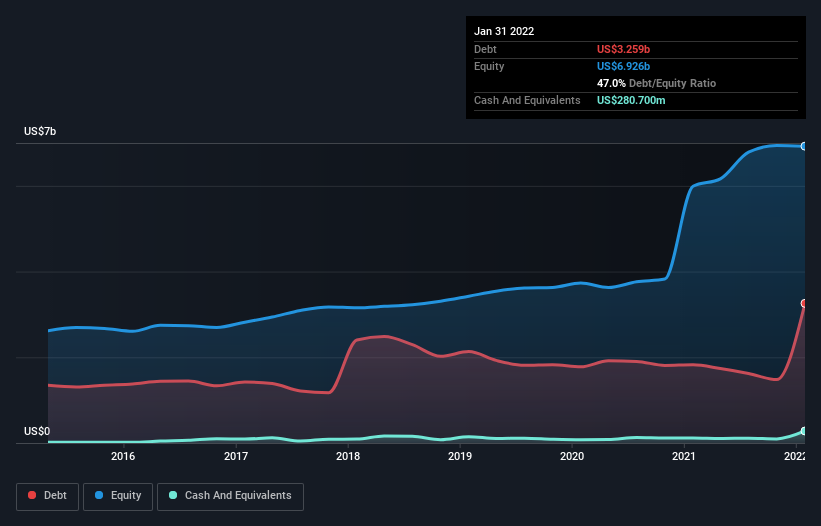- United States
- /
- Medical Equipment
- /
- NasdaqGS:COO
Cooper Companies (NYSE:COO) Has A Rock Solid Balance Sheet

Warren Buffett famously said, 'Volatility is far from synonymous with risk.' So it seems the smart money knows that debt - which is usually involved in bankruptcies - is a very important factor, when you assess how risky a company is. As with many other companies The Cooper Companies, Inc. (NYSE:COO) makes use of debt. But should shareholders be worried about its use of debt?
What Risk Does Debt Bring?
Debt assists a business until the business has trouble paying it off, either with new capital or with free cash flow. Part and parcel of capitalism is the process of 'creative destruction' where failed businesses are mercilessly liquidated by their bankers. However, a more usual (but still expensive) situation is where a company must dilute shareholders at a cheap share price simply to get debt under control. By replacing dilution, though, debt can be an extremely good tool for businesses that need capital to invest in growth at high rates of return. When we think about a company's use of debt, we first look at cash and debt together.
See our latest analysis for Cooper Companies
What Is Cooper Companies's Net Debt?
You can click the graphic below for the historical numbers, but it shows that as of January 2022 Cooper Companies had US$3.26b of debt, an increase on US$1.83b, over one year. On the flip side, it has US$280.7m in cash leading to net debt of about US$2.98b.

How Strong Is Cooper Companies' Balance Sheet?
We can see from the most recent balance sheet that Cooper Companies had liabilities of US$1.66b falling due within a year, and liabilities of US$3.07b due beyond that. On the other hand, it had cash of US$280.7m and US$525.9m worth of receivables due within a year. So its liabilities outweigh the sum of its cash and (near-term) receivables by US$3.93b.
While this might seem like a lot, it is not so bad since Cooper Companies has a huge market capitalization of US$18.6b, and so it could probably strengthen its balance sheet by raising capital if it needed to. But it's clear that we should definitely closely examine whether it can manage its debt without dilution.
We measure a company's debt load relative to its earnings power by looking at its net debt divided by its earnings before interest, tax, depreciation, and amortization (EBITDA) and by calculating how easily its earnings before interest and tax (EBIT) cover its interest expense (interest cover). The advantage of this approach is that we take into account both the absolute quantum of debt (with net debt to EBITDA) and the actual interest expenses associated with that debt (with its interest cover ratio).
Cooper Companies's net debt is 3.2 times its EBITDA, which is a significant but still reasonable amount of leverage. However, its interest coverage of 26.1 is very high, suggesting that the interest expense on the debt is currently quite low. Importantly, Cooper Companies grew its EBIT by 44% over the last twelve months, and that growth will make it easier to handle its debt. There's no doubt that we learn most about debt from the balance sheet. But ultimately the future profitability of the business will decide if Cooper Companies can strengthen its balance sheet over time. So if you're focused on the future you can check out this free report showing analyst profit forecasts.
Finally, a business needs free cash flow to pay off debt; accounting profits just don't cut it. So the logical step is to look at the proportion of that EBIT that is matched by actual free cash flow. During the last three years, Cooper Companies produced sturdy free cash flow equating to 75% of its EBIT, about what we'd expect. This free cash flow puts the company in a good position to pay down debt, when appropriate.
Our View
The good news is that Cooper Companies's demonstrated ability to cover its interest expense with its EBIT delights us like a fluffy puppy does a toddler. But truth be told we feel its net debt to EBITDA does undermine this impression a bit. It's also worth noting that Cooper Companies is in the Medical Equipment industry, which is often considered to be quite defensive. Zooming out, Cooper Companies seems to use debt quite reasonably; and that gets the nod from us. After all, sensible leverage can boost returns on equity. There's no doubt that we learn most about debt from the balance sheet. However, not all investment risk resides within the balance sheet - far from it. Be aware that Cooper Companies is showing 3 warning signs in our investment analysis , you should know about...
Of course, if you're the type of investor who prefers buying stocks without the burden of debt, then don't hesitate to discover our exclusive list of net cash growth stocks, today.
New: AI Stock Screener & Alerts
Our new AI Stock Screener scans the market every day to uncover opportunities.
• Dividend Powerhouses (3%+ Yield)
• Undervalued Small Caps with Insider Buying
• High growth Tech and AI Companies
Or build your own from over 50 metrics.
Have feedback on this article? Concerned about the content? Get in touch with us directly. Alternatively, email editorial-team (at) simplywallst.com.
This article by Simply Wall St is general in nature. We provide commentary based on historical data and analyst forecasts only using an unbiased methodology and our articles are not intended to be financial advice. It does not constitute a recommendation to buy or sell any stock, and does not take account of your objectives, or your financial situation. We aim to bring you long-term focused analysis driven by fundamental data. Note that our analysis may not factor in the latest price-sensitive company announcements or qualitative material. Simply Wall St has no position in any stocks mentioned.
About NasdaqGS:COO
Cooper Companies
Develops, manufactures, and markets contact lens wearers.
Excellent balance sheet with proven track record.
Similar Companies
Market Insights
Community Narratives




